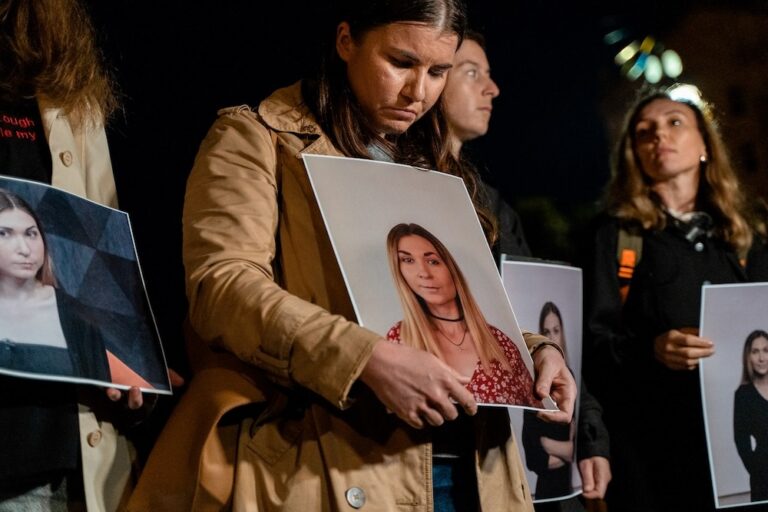(CPJ/IFEX) – The following is a 30 October 2007 CPJ press release: Prosecutors open probe into 2003 death of Moscow reporter New York, October 30, 2007 – The Committee to Protect Journalists welcomes a decision by an arm of the Russian prosecutor general to open a criminal probe into the mysterious July 2003 death of […]
(CPJ/IFEX) – The following is a 30 October 2007 CPJ press release:
Prosecutors open probe into 2003 death of Moscow reporter
New York, October 30, 2007 – The Committee to Protect Journalists welcomes a decision by an arm of the Russian prosecutor general to open a criminal probe into the mysterious July 2003 death of Yuri Shchekochikhin, deputy editor of the Moscow newspaper Novaya Gazeta.
“We welcome this important if overdue step on behalf of Russian prosecutors to uncover the truth about the death of our colleague Yuri Shchekochikhin,” CPJ Executive Editor Joel Simon said. “We now call on the prosecutor general’s office to carry out a thorough, unbiased, and transparent investigation with an emphasis on Shchekochikhin’s journalism as the most likely motive. We also call on the relevant authorities to immediately declassify Shchekochikhin’s medical tests and death certificate and release them to his family and colleagues.”
Novaya Gazeta received word on Friday that the prosecutor would open a criminal probe, the paper’s editor-in-chief, Dmitry Muratov, told CPJ. Shchekochikhin’s colleagues have repeatedly sought a criminal investigation but, until now, have been rebuffed. The reporter died 12 days after being hospitalized in a Moscow clinic with what doctors called an acute allergy.
“I am not going to speculate on what killed my closest friend; it is up to the experts to determine that,” Muratov told CPJ. “I can only say that Yuri’s symptoms before he died had nothing to do with an allergic reaction.”
The decision to open the criminal probe was initiated by the prosecutor general’s investigative committee, a newly created office in charge of opening and overseeing criminal cases.
Colleagues and relatives believe that Shchekochikhin, 53, was poisoned to prevent him from uncovering high-level corruption involving officials from the Federal Security Services (FSB) and the prosecutor general’s office.
Shchekochikhin had worked for Novaya Gazeta since 1996, covering dangerous assignments such as the Chechen conflict, arms trade, and organized crime. From 2001 until his sudden death in 2003, he had written a series of investigative reports on a Moscow furniture store allegedly at the center of a tax evasion and money laundering scheme that involved FSB officials.
As a member of Russia’s parliament, Shchekochikhin had a rare ability to interview officials and review documents related to the case. His last story on the scheme, published on June 2, 2003, described the murder of a key witness in the case. One month later, Shchekochikhin was dead as well, victim of an “unknown allergen” that caused his hair to fall out, his skin to peel, and his organs to fail.
He fell ill on June 17, 2003, while on a business trip in the city of Ryazan, 200 kilometers (120 miles) southeast of Moscow. Overtaken by flu-like symptoms, he returned to Moscow with a fever, sore throat, body aches, and a burning sensation, Novaya Gazeta reported. The next day, a doctor diagnosed him with an acute respiratory viral infection. Shchekochikhin’s health deteriorated rapidly in the next few days and he was hospitalized on June 21. Over the next 12 days, his organs failed one by one.
Doctors said Shchekochikhin suffered from a severe allergic reaction, but the allergen was never identified and the reporter’s test results were classified as a “medical secret,” Novaya Gazeta reported. Moscow Central Clinical Hospital has refused to give the family and colleagues access to the records.
The business daily Kommersant, citing an unnamed source, reported today that prosecutors decided to review Shchekochikhin’s file in light of the November 2006 death in London of Aleksandr Litvinenko, a former security agent turned Kremlin critic. Litvinenko died of radiation poisoning from the rare substance polonium-210. The source said Shchekochikhin’s symptoms were considered similar.
CPJ is a New York-based, independent, nonprofit organization that works to safeguard press freedom worldwide. For more information in Russia, visit http://www.cpj.org


